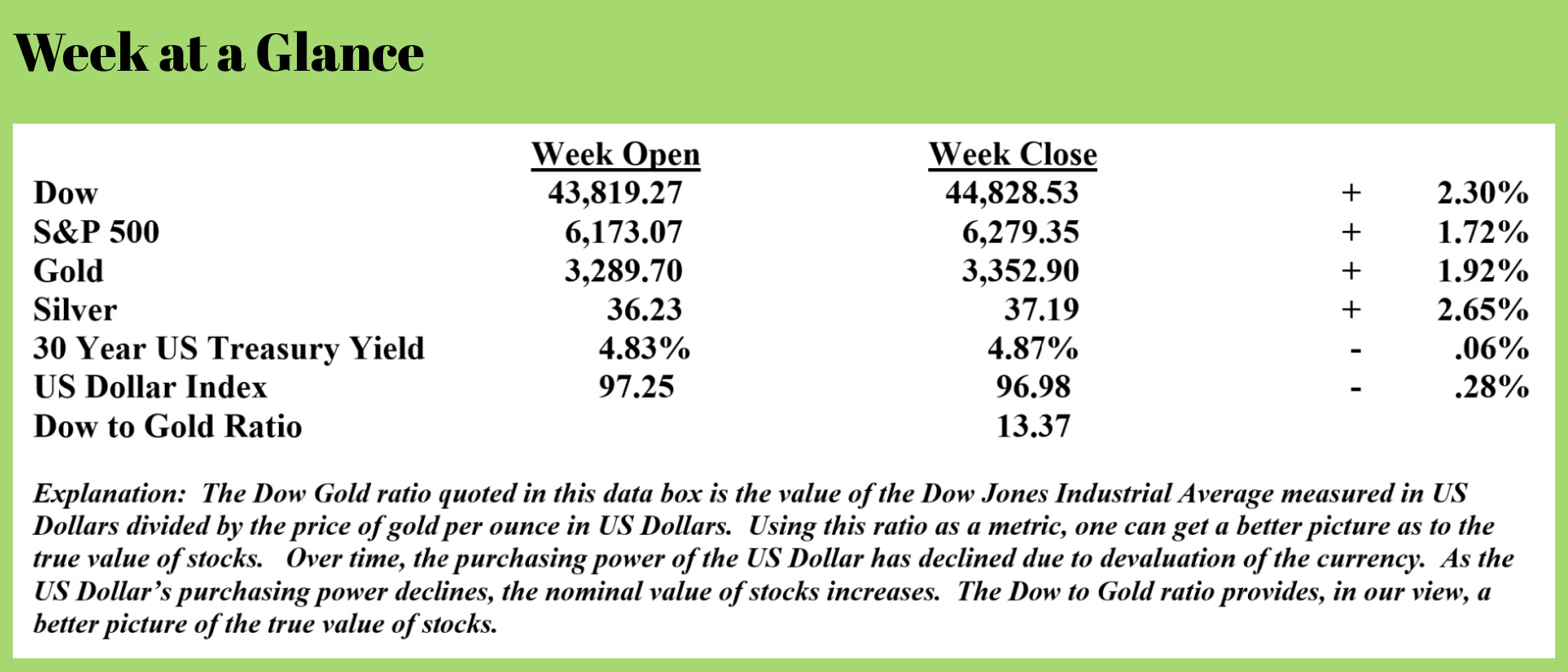
 Weekly Update from RLA Tax and Wealth Advisory
Weekly Update from RLA Tax and Wealth Advisory

”The Cycle of Tax Policies”
As I write this update, the House and the Senate have passed, and President Trump has signed the ‘big, beautiful bill”. As I write this, the president has just signed the bill. Into law less than 14 hours ago, so I have not yet had time to dig into the opportunities for tax savings that have undoubtedly been created. More on those specifics in a later issue of “Portfolio Watch.”
Seems, though, that the bill preserves some of the tax savings opportunities relating to retirement accounts, as the tax cuts set to expire at the end of this year have been extended. Additionally, income from tips and overtime will not be taxed up to limits.
Meanwhile, as the United States is extending tax cuts, the country of Switzerland is putting a referendum on the ballot, letting Swiss voters decide if there should be a 50% inheritance tax on the wealthiest Swiss citizens. The proposed law is so harsh that even surviving spouses would have to pay the tax. (Source: https://www.zerohedge.com/economics/swiss-vote-50-inheritance-tax-risks-exodus-super-rich)
Opponents of the inheritance tax measure are correctly pointing out that passing such a law would have the wealthiest Swiss citizens moving out of the country and renouncing their citizenship to avoid the tax. The measure will go to a popular vote on November 30.
Interestingly, Switzerland is contemplating a draconian inheritance tax even after the United Kingdom has tried something similar – and failed. In April, a new law kicked in in the UK that imposed a 40% inheritance tax on the global assets of “non-doms.” If you’re not familiar with that term, it refers to residents of the United Kingdom who are considered to have their permanent home, or domicile, in another country.
The ruling class is already considering ways to rescind the law after it triggered an exodus of wealthy people from the country.
So, why am I even bringing this up? Especially in light of the fact that tax law in the US is becoming more favorable.
For one very important reason. Tax policies cycle moving from oppressive to tolerable and then back to oppressive again. And, history teaches us that the move in tax policy from tolerable to oppressive can happen quickly and with little or no warning.
The top federal income tax rate in 1913 was less than 10%. At the onset of World War I, the top tax rate soared to more than 70%.
During the “Roaring 1920s,” the top income tax rate was about 25%, rising to more than 60% when the Depression emerged and then to more than 90% when the US got involved in World War II.
The bottom line is this. Despite the passage of the ‘big, beautiful bill’ and lower tax rates for the near term, history teaches us that longer-term tax rates will likely move higher as tax policy eventually becomes more oppressive.
But you can protect yourself.
It requires action and a little attention to detail, but now is the time to put strategies in place to protect you and your heirs from future tax law changes.
Happy to help if you’d like an opinion. Just give the office a call at 866-921-3613.
Metals Update
Alasdair MacLeod, a past guest on RLA Radio (multiple times), recently stated his opinion that we are presently in an environment that is similar to the climate experienced in 1929. (Source: https://www.zerohedge.com/precious-metals/last-time-gold-moved-was-1929)
MacLeod points to the US debt trap, noting that there are very few entities or countries around the globe who are willing to bet on the US Dollar, especially long-term, concluding that it’s unlikely that the US Dollar will still be a desirable asset in 20-30 years. The US is running a deficit of 6%+ of gross domestic product, which means that stagflation will be a difficult outcome to avoid.
Macleod notes that the situation is so bad that central banks are even taking on other currencies to minimize exposure to the US Dollar.
MacLeod’s analysis of COMEX open interest suggests that gold might still be underbought. This is the first time since 1977 that US assets have all broadly fallen while gold has gone up, except for 1929.
Central banks are buying gold because, as they look to the future, the very fiat currencies that they control don’t look as good as gold.
Have you diversified from the US Dollar?
Great June Jobs Report, Or Was It?
The Bureau of Labor Statistics reported that the US economy created 147,000 jobs in the month of June, a far bigger number than was expected. (Source: https://mises.org/mises-wire/half-junes-job-growth-was-government-manufacturing-jobs-fall)
The only potential problem with this level of job growth is that 73,000 of the 147,000 jobs created were government jobs. That means only 74,000 jobs were in the private sector.
That put private sector job growth at a none-month low. Manufacturing jobs in the private sector were negative month-over-month for the second month in a row. Over the past twelve months, manufacturing job growth has been zero or negative for eight months.
In only two of those months did manufacturing jobs grow by more than 1000 jobs.
Despite the hoopla, this jobs report is a weak one for the private sector. Seems that the deflationary effects of debt excesses are continuing to emerge. Have you planned your finances accordingly?
RLA Radio
The RLA radio program this week features an interview that I conducted with Mr. Karl Deninger of market-ticker.org. Karl and I talk about the real cause of obscene medical costs and the health of the US economy.
Quote of the Week
“I couldn’t wait for success, so I went ahead without it.”
- Jonathan Winters



Comments